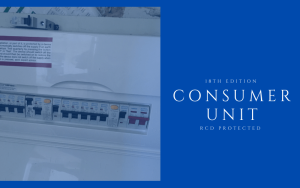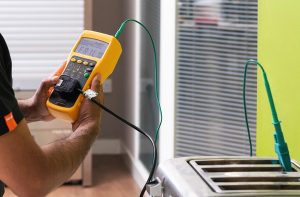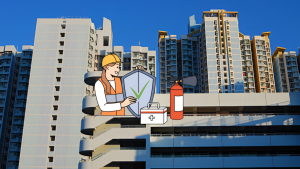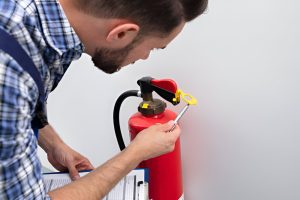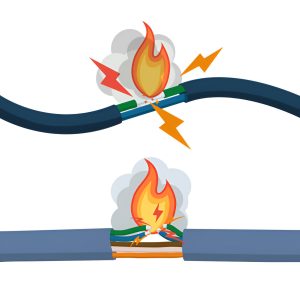Fire safety is an incredibly important issue, and one that every rental property owner should take seriously. As a fire safety specialist, I’m here to provide you with the top tips for maintaining fire safety in your rental properties so that you can be sure everyone on your premises is safe.
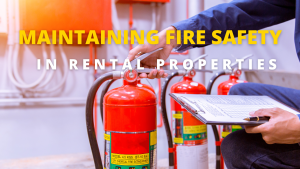
This article will help you understand what steps need to be taken in order to keep your tenants and their belongings protected from fires. By following the advice provided in this article, you’ll have peace of mind knowing that you’ve done all that’s necessary to ensure the highest possible level of fire protection in your rental units.
It won’t just benefit those living there; it’ll also give you confidence as a landlord or property manager that everything has been done to prevent dangerous situations arising due to inadequate fire safety measures. So let’s get started!
Educating Tenants On Fire Safety
Educating tenants on fire safety is essential to the safe functioning of rental properties. It’s important for landlords and property managers to promote awareness, both among tenants and within their own staff, about the importance of following safety protocols in order to prevent fires from starting or spreading quickly.
Fire safety education can be delivered through a variety of methods, such as distributing pamphlets with information about fire hazards and evacuation plans, hosting seminars or workshops that cover best practices in preventing fires, conducting regular drills so people know what actions they need to take when an emergency happens, and offering online courses for tenants who are not able to attend physical events.
Raising awareness among tenants should include simple steps like ensuring smoke detectors are installed in every room and regularly tested; checking electrical outlets for overloaded circuits; making sure exits remain clear at all times; avoiding using kitchen appliances while asleep; using space heaters correctly; keeping combustible materials away from potentially hot surfaces; providing proper ventilation when cooking indoors; never leaving lit candles unattended; and understanding how to use a fire extinguisher if needed.
Landlords must also ensure that no one smokes inside the apartment building or near flammable objects outside it.
With effective communication strategies in place, rental property owners can help protect residents by educating them on how to identify potential sources of danger before they become a problem—and how to respond safely if an accident does occur. In this way, tenants have greater confidence knowing that their landlord has taken responsibility for promoting fire safety measures across the board.
Installing Fire Alarms And Smoke Detectors
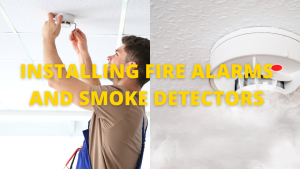
Installing fire alarms and smoke detectors is an essential component of maintaining fire safety in rental properties. Not only do they provide invaluable protection against fires, but they also give tenants peace of mind.
As a fire safety specialist, I strongly recommend installing carbon monoxide detectors as well to ensure that all dangerous gases are detected early on. Ensuring sufficient lighting throughout the property is equally important; strategically placed lights will help minimize the risk of any potential accidents caused by poor visibility.
It’s crucial to make sure that all smoke detectors are tested periodically—at least once every month—and have their batteries changed regularly. It’s also vital for landlords to keep accurate records about when these checks were done and who carried them out so that if there ever was an emergency, you can rest assured knowing that your property has been maintained properly.
Additionally, it’s wise to remind occupants to never disable or tamper with any of the detector systems at any point during their tenancy agreement.
Keeping up-to-date with modern fire regulations should be high up on every landlord’s priority list too since changes or updates may require additional equipment installation like sprinklers or extra extinguishers which could further safeguard everyone living in your rental property from harm.
If you’re uncertain whether your building complies with current standards, get in touch with a local authority or experts such as myself who’ll be able to advise you accordingly and offer solutions tailored specifically for your needs.
Conducting Regular Fire Safety Inspections
Having installed a fire alarm and smoke detector, the next vital step to ensure that your rental property is safe from fires is conducting regular fire safety inspections. Scheduling checks at least once or twice a year can help you stay on top of any potential risks in the home and take preventative measures before they become an issue.
Here are some tips for making sure your inspection process is thorough:
- Check all appliances regularly to make sure they’re in good working order and look out for frayed wires, exposed wiring and other signs of damage.
- Test smoke detectors monthly according to manufacturer instructions so that you know they’ll be operational when needed.
- Make sure all doors, windows and vents open easily in case of emergency evacuation.
- Ensure furniture isn’t blocking exits or pathways leading away from possible danger spots like kitchens or living rooms.
- Look over chimneys, flues and extractor fans for any blockages which could cause a build up of carbon monoxide or other toxic gases inside the property.
It’s also important to have an evacuation plan established with tenants so everyone knows what do if there does happen to be a fire on the premises. Have them audit their own room too; ask them whether items are being stored properly, if electric sockets are overloaded etc., as this will give both parties peace of mind should an incident occur.
Regularly reviewing these steps can help keep both tenant and landlord safe from harm – not only during their occupancy but long after it has ended too!
Ensuring Adequate Fire Exits
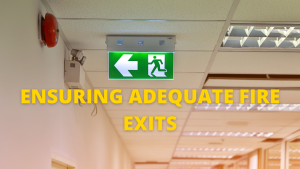
Having adequate fire exits is a crucial part of maintaining fire safety in rental properties. Without them, any threat to occupants’ safety becomes much more serious and can even lead to tragedy. As such, ensuring compliance with relevant building codes and regulations should be a priority for anyone looking after these dwellings.
This means having an appropriate number of doors or windows as emergency escapes from each room, depending on its size and layout. Storing combustibles safely is also important when it comes to preventing fires at rental properties. Combustible items like matches, lighters, and gas cylinders need to be kept out of reach from tenants – ideally locked away in secure cabinets or cupboards.
Additionally, all furniture made up of flammable materials needs to be regularly checked for signs of wear-and-tear that could cause the materials to ignite easily – this includes couches, armchairs, mattresses etc. Building inspections are another great way of making sure that you are adhering to standards when it comes to fire safety at your property.
Having somebody come in periodically and check all areas where combustibles may have been stored can help identify any potential danger spots early on before they become an issue down the line. On top of this, they will also be able to give advice regarding how best to improve existing systems so that you stay one step ahead against the risk of fire at your dwelling.
Regularly Testing Fire Extinguishers
It’s essential to check the expiry date on all fire extinguishers in a rental property. Failure to do so could result in the extinguishers being expired and unable to be used in an emergency.
Proper placement of fire extinguishers is also key – they should be easily accessible and clearly visible.
Additionally, it’s important to perform regular pressure tests to make sure they’re capable of being used in the event of a fire. I recommend testing fire extinguishers every year to ensure they’re in proper working order and ready to go if needed.
If any of the extinguishers are expired, not properly placed, or fail the pressure test, they should be replaced immediately.
Lastly, don’t forget to keep records of all inspections and tests for each fire extinguisher.
Check Expiry Dates
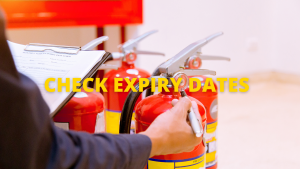
It’s essential that all fire safety equipment, such as fire extinguishers, are regularly tested and maintained to ensure they remain in perfect working order.
One of the most important parts of this process is checking expiry dates. Believe it or not, these can vary from one type of fire extinguisher to another!
As a fire safety specialist, I always recommend checking your extinguishers’ expiry dates at least once every month. This way you’ll be sure that both yourself and your tenants will have access to effective life-saving tools should an emergency arise.
Additionally, when it comes to keeping up with regular maintenance checks and testing frequency, I highly suggest investing in certified fire safety training for you or your staff so everyone knows what needs doing and how often it needs doing.
Identify Proper Placement
Once the expiry dates are checked, it’s also important to ensure that fire extinguishers are properly placed in an easily accessible area.
Visibility is key here – if you can’t spot a fire extinguisher quickly and securely access it, then it may not be of much use in case of an emergency!
Make sure they’re mounted on walls or stands at eye level with clear signs pointing towards them for additional visibility.
When placing your extinguishers, make sure there’s no obstruction between you and the device so that you won’t have any difficulties getting to them when needed.
Finally, don’t forget to check their placement periodically and adjust as necessary throughout the year.
Perform Pressure Tests
It’s also important to ensure that fire extinguishers are in compliance with safety regulations.
That can be achieved by performing pressure tests, which should be done at least once a year as part of the preventative maintenance routine.
This helps check for any leaks or issues with the mechanism and guarantees that your fire extinguishers will always work up to expectations when needed.
As an added bonus, regular pressure testing is also necessary for meeting some local standards and ensuring you remain compliant with them.
With all these steps taken care of, you can rest assured that your fire extinguishers are ready to do their job!
Having A Fire Evacuation Plan In Place
Now that fire extinguishers have been regularly tested and maintained, it is imperative to create a comprehensive and effective plan for protecting occupants in the event of an emergency.
Having a clear fire evacuation plan should be one of your top priorities when managing rental properties. It involves creating drills, outlining response protocols, and helping tenants understand their roles during an emergency situation.
When constructing a fire evacuation plan, make sure you consider all potential risks associated with the property. This includes both indoor hazards such as faulty wiring or blocked escape routes as well as outdoor threats like combustible materials stored too close to the building. The best plans also account for vulnerable populations such as children and seniors who may require extra assistance during an emergency.
It’s important to keep your tenants informed about how they can protect themselves in case of a fire. Establishing regular safety meetings and distributing detailed instructions on what steps to take if there is a fire will help ensure everyone knows what to do when disaster strikes.
Regularly reviewing these procedures are critical because tenant turnover means new people must be briefed on the protocol each time someone moves out or moves in. By having a thorough understanding of how to respond quickly and appropriately, you can minimize damage from fires and reduce stress levels among tenants in case of emergencies.
Keeping Flammable Materials Away From Ignition Sources
Keeping flammable materials away from ignition sources is like a game of chess: if you make the wrong move, your property and its inhabitants can be put at risk. To prevent such risks, it’s important to properly store combustible items in areas that are far away from potential sources of heat or flame.
Here are some tips for avoiding fire hazards with proper storage:
- Store all flammable liquids (such as paint thinners) outdoors in sealed containers and correctly labeled.
- Keep any lighters, matches, candles, grills or other igniting objects out of reach of children.
- Ensure that any heating system is regularly serviced by a qualified technician and maintained according to manufacturer’s instructions.
By following these simple safety measures, landlords can ensure their rental properties remain free from hazardous fires.
It is essential for landlords to create an environment that puts resident safety first; this includes making sure all combustible materials are stored safely and kept away from ignition sources. Taking these precautions will help protect people living in your rental property from the dangers of fire hazards.
Observing Local Fire Codes And Regulations
It’s essential to research local laws when it comes to fire safety in rental properties. Fire safety guidelines should be followed to ensure the safety of tenants and anyone else who visits the property.
Installing fire safety features is a must; smoke alarms, fire extinguishers and an evacuation plan should all be implemented. You should also make sure these features are regularly tested and maintained.
It’s also important to be aware of any other fire safety regulations that may be in place in the area. Remember, any fire safety lapses can have serious consequences, so it’s important to take all necessary steps to ensure the safety of your rental property.
Research Local Laws
As a fire safety specialist, it is important to ensure that rental properties comply with all applicable laws and regulations.
One way to do this is by researching local fire codes and regulations in your area.
Seeking advice from experienced professionals can help you understand the exact requirements for each property and establish protocols for meeting those standards.
It’s also wise to have an understanding of the different types of materials used in construction projects and how they might influence potential fire risks.
By taking these steps, landlords can gain valuable insights into best practices for mitigating risk and increasing tenant safety within their rental units.
With proper planning and research, landlords can create a safe environment for tenants while avoiding costly fines or other legal penalties resulting from non-compliance with local fire codes.
Follow Fire Safety Guidelines
As a fire safety specialist, it’s essential to ensure that rental properties comply with local fire codes and regulations.
An effective way to do this is by promoting awareness of applicable laws while also implementing protocols for meeting those standards.
To help achieve this goal, landlords should take the time to familiarize themselves with the different types of materials used in construction projects and how they might influence potential fire risks.
Taking these steps can help create an atmosphere of safety and security within their rental units while avoiding costly fines or other legal penalties resulting from non-compliance.
Install Safety Features
Once landlords become familiar with fire regulations, the next step is to install safety features that help mitigate risk.
This includes barriers like smoke detectors and sprinkler systems in addition to storing hazardous chemicals safely away from ignition sources.
By taking these proactive steps, it’s possible for rental properties to remain compliant while also protecting tenants from potential harm.
It’s important to note that even though certain materials may make a building appear more aesthetically pleasing, they must not be used if there are any questions about their flammability or combustibility.
Keeping this in mind will go a long way towards ensuring the safety of all occupants within the residence.
Installing Fire Sprinkler Systems
As previously discussed, observing local fire codes and regulations is important for keeping rental properties safe from potential fires. Now let’s consider how to even further reduce the risk of a devastating blaze: installing fire sprinkler systems.
Fire sprinkler systems are an invaluable resource when it comes to preventing serious injury or damage due to a fire emergency. Fire sprinklers detect signs of heat or smoke in order to activate water flow rapidly throughout the property. This limits the amount of time that any given area is exposed to a hazardous flame, thereby reducing the chances of irreparable damage occurring during an emergency.
Furthermore, these systems may be equipped with automatic shut-off valves that deactivate once flames have been extinguished, ensuring no more water is used than necessary when trying to extinguish a blaze.
For those who already have fire sprinkler systems installed in their rental properties, maintenance should absolutely not be overlooked! Regular inspections by certified professionals should take place at least every year, while other parts such as heads and piping need routine cleaning and adjustment depending on usage and environment conditions.
In addition, all occupants must know where the manual emergency shut off valve is located in case additional measures need to be taken quickly during a crisis situation. By combining proper installation practices with consistent upkeep procedures, landlords can rest assured knowing they are doing everything possible to keep their tenants safe from harm caused by unexpected fires.
Maintaining Fire Suppression Systems
Maintaining fire suppression systems is an absolute must for any rental property; this simple task can make the difference between life and death.
Fireproofing materials are essential in keeping your rental safe from potential fires, but it’s not just about having them installed – preventative maintenance is key. Without regular inspections and care of your fire suppression system, you could be doing more harm than good!
It’s important to remember that a fire suppression system only works if its components are functioning properly. This means testing all sprinklers and smoke alarms regularly, inspecting hoses for leaks or blockages, and performing routine checkups on pumps and nozzles.
Additionally, do not forget to use certified fireproofing materials when installing or replacing any part of the system; they will help keep your tenants safe in case of an emergency.
It doesn’t take too much time or effort to ensure that your fire suppression system is operational and up-to-date. All it requires is some dedication and attention, which could very well save lives one day – so don’t hesitate to stay on top of these matters!
Regular inspections should provide peace of mind both for yourself as the landlord as well as your tenants who rely on you for safety while living at your premises.
Frequently Asked Questions
What Should I Do If I Suspect A Fire In My Rental Property?
If you suspect a fire in your rental property, the most important thing to do is stay calm.
You should have already created a fire safety plan with emergency evacuation routes for yourself and any occupants; if so, it’s time to put that plan into action.
Don’t assume someone else will call 911—you need to take charge of the situation and make sure everyone gets out safely.
Make sure all doors and windows are open while exiting, as this will help minimize smoke inhalation during an emergency.
Finally, don’t attempt to search or fight the fire on your own; give first responders access by informing them of what has happened when they arrive at the scene.
How Often Should I Check My Fire Alarms And Smoke Detectors?
Regular testing of fire alarms and smoke detectors is the key to preventing fires in rental properties.
Picture this: a smoke detector that has not been tested in years, sitting dormant while an unsuspecting tenant sleeps soundly. Without regular checks, there could be a tragedy waiting to happen!
As a fire safety specialist, I recommend checking your fire alarms and smoke detectors every 6 months or so to ensure they are working correctly.
This simple step will help keep you and your tenants safe from any potential hazards associated with fires.
Are There Any Special Regulations I Should Be Aware Of When Installing Fire Extinguishers?
When it comes to installing fire extinguishers, proper placement and following local regulations are crucial for ensuring the safety of your rental property.
Most regions have their own rules and guidelines when it comes to where they should be placed in order to maximize efficiency during an emergency.
It’s also important that all tenants receive proper training on how to use a fire extinguisher if needed.
This will ensure everyone knows what to do in case of a fire.
How Often Should I Conduct Fire Safety Inspections?
Are you a rental property owner wondering how often to conduct fire safety inspections?
As a fire safety specialist, I recommend inspecting your building twice yearly.
Fireproofing and emergency planning are essential steps to ensure the safety of your tenants.
Conduct an inspection in the spring and fall, or more frequently if necessary.
Investigate any reports from tenants about potential hazards such as frayed wires or blocked exits.
Make sure that all smoke detectors are working properly and check for any damaged wiring or combustible materials inside the building.
Keep detailed records of each inspection so that you can keep track of their progress over time.
What Is The Best Way To Ensure That Flammable Materials Are Stored Away From Ignition Sources?
When discussing the best way to ensure that flammable materials are stored away from ignition sources, it is essential for fire safety specialists to take into consideration both fireproofing materials and safe disposal.
Fireproofing materials act as a barrier between combustible items and any potential source of heat or flame, such as an oven, gas heater, or cigarette lighter.
In addition, safe disposal should be practiced with all hazardous materials in order to prevent fires due to improper storage.
By taking proactive steps towards properly storing flammable items and correctly disposing of them after use, rental property owners can help reduce the risk of a fire starting on their premises.
Conclusion
It all boils down to this: As a rental property owner, fire safety is your responsibility.
By taking the necessary precautions and staying informed of local regulations, you can ensure that your tenants are safe from harm’s way in the event of a fire.
Remember, an ounce of prevention is worth a pound of cure – so take the time to do regular checks and inspections on your property to make sure it is up-to-date with fire safety standards.
I’m confident that if you follow these tips, you’ll be able to maintain a safe environment for everyone who lives or visits your home.



